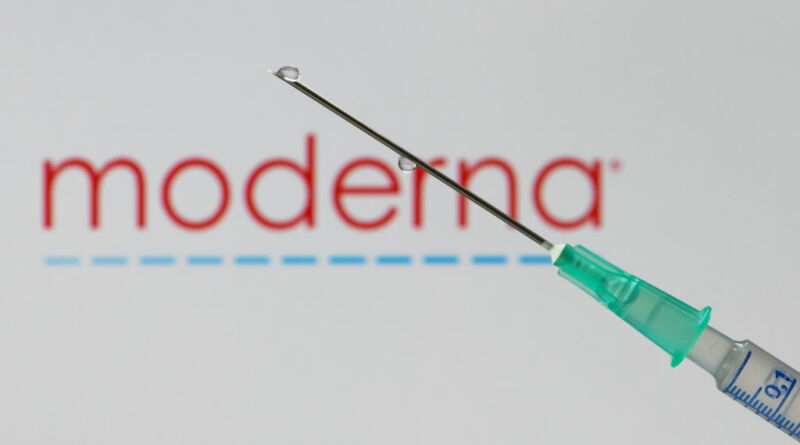
Vaccine maker Moderna has forked over $400 million to the National Institutes of Health for using a molecular stabilizing technique borrowed from government and academic researchers in its mRNA-based COVID-19 vaccine—which the company made roughly $36 billion selling amid the deadly pandemic, according to The New York Times.
Moderna mentioned the payment in the company’s latest earnings report, which described the sum as a “catch-up payment” negotiated with the NIH in December as part of a new royalty-bearing license agreement. The agreement will also grant the NIH “low single-digit royalties on future COVID-19 vaccine sales.” The company expects to make around $5 billion in COVID-19 vaccine sales in 2023.
The molecular technique at the center of the agreement is designed to stabilize the SARS-CoV-2 spike protein so that it can spur a strong immune response following vaccination. The mRNA-based vaccine delivers genetic code for the spike protein, which is then translated by human cells into protein. Researchers at the NIH’s National Institute of Allergy and Infectious Diseases (NIAID)—as well as collaborators at Dartmouth and The Scripps Research Institute in La Jolla, California—came up with a method of tweaking the mRNA code so that, when translated, the spike protein would stay locked in a specific conformation best for generating an immune response. They had developed the technique years before the pandemic, publishing it in a 2017 study involving the spike protein from a SARS-CoV-2 relative, MERS-CoV, aka the Middle East respiratory syndrome coronavirus. Moderna began collaborating with the NIAID on a general design for mRNA-based vaccines in 2016, but none of its scientists were authors of the 2017 paper.
The Times reported that NIH would share the catch-up payment from Moderna with Dartmouth and Scripps.
While the agreement seems to settle one aspect of rights over the life-saving, billion-dollar vaccine, a larger fight still looms. That fight is centered around a principal patent Moderna filed over the entirety of the mRNA sequence used in the vaccine. Moderna says its scientists came up with the sequence independently, while the NIH says its researchers came up with it and gave it to the company. The agency requested Moderna list three NIH researchers as co-inventors on the patent they filed. But Moderna excluded them, as Nature reported back in 2021.
“Not done”
At the time, then-NIH director Francis Collins told Reuters that the NIH had spent time trying to resolve the dispute amicably with Moderna but had failed. “I think Moderna has made a serious mistake here in not providing the kind of co-inventorship credit to people who played a major role in the development of the vaccine that they’re now making a fair amount of money off of,” Collins said.
“But we are not done,” he added. “Clearly this is something that legal authorities are going to have to figure out.” A spokesperson for Collins later clarified to the Times that by “legal authorities,” Collins meant government lawyers.
It’s unclear how that dispute will resolve, and such patent fights can take years to unfold. It’s also unclear how aggressive the federal agency will ultimately be over its co-inventor status. As Nature pointed out earlier, the agency has tended to let industry partners handle intellectual property rights as it sees its role largely in the foundational research. But with drug prices continuing to skyrocket in the US, political will is shifting for the government to be more involved in the outcomes of its early-stage efforts.
As the Times notes, not only did Moderna make roughly $36 billion in sales from COVID-19 vaccines worldwide, the company also received $10 billion in taxpayer funding to help develop and test the vaccine. Yet, this year, the company signaled that it would raise the price of the vaccine by 400 percent as it moves from government distribution to the commercial market. Amid backlash to this plan and an upcoming Congressional hearing, Moderna released a commitment statement last week saying that Americans “will have access to Moderna’s COVID-19 vaccine regardless of their ability to pay.” But it’s still unclear what that means and how the company’s financial assistance programs will work.
As for the agreement with the NIH revealed yesterday, Moderna spokesperson Chris Ridley said in a statement to the Times that they “have been engaged in productive discussions since 2020 regarding the licensing of certain patents related to COVID-19 vaccines.” He added that “It was always our intention to reach an agreement, and we were pleased to have done so this past December.”
https://arstechnica.com/?p=1920085

